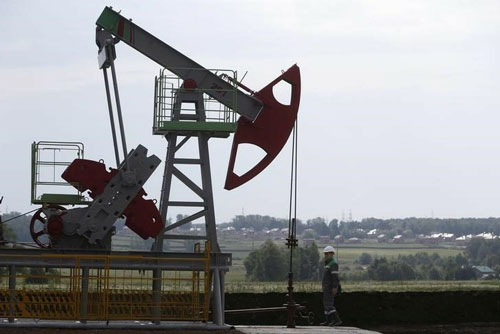London
Oil prices fell for a third session on Wednesday, with U.S. crude futures tumbling to an 18-year low and Brent hitting a more than 16-year low as travel and social lockdowns to counter the coronavirus raised prospect of the steepest ever annual fall in oil demand. U.S. crude Clc1 was down $2.82, or 10.5%, at $24.13 a barrel by 1400 GMT, having earlier touched its lowest since April 2002 at $23.60.
The last time oil traded that low was when China had only just begun its rise as a global economic superpower that propelled the world’s oil consumption to record highs in subsequent years. Brent crude LCOc1 was trading down $1.91, or 6.7%, at $26.82 a barrel after dropping as low as $26.65, its weakest since late 2003.
Both contracts were on track for a quarterly decline of about 60%, the sharpest since at least the 1980s. Investment banks and consultancies have been making heavy cuts to their demand forecasts as a growing number of the world’s largest cities and economies restrict movement.
“The oil demand collapse from the spreading coronavirus looks increasingly sharp,” Goldman Sachs said in a note, forecasting a fall in Brent prices to as low as $20 in the second quarter, a level not seen since early 2002. The bank expects a demand contraction of 8 million barrels per day (bpd) by late March and an annual decline in 2020 of 1.1 million bpd, which it said would be the biggest on record.
Rystad Energy has gone even further, projecting a year-on-year decline in demand of 2.8 million bpd, or 2.8%, this year. “To put the number into context, last week we projected a decrease of just 600,000 barrels,” Rystad said.
In addition to imposing social restrictions not seen since World War Two, the world’s richest nations prepared to unleash trillions of dollars of spending to reduce the fallout from the coronavirus. The impact on demand is starting to show in official statistics, with Japan’s trade bureau saying on Wednesday that crude imports into the world’s third-biggest economy in February were down 9% from a year earlier.
Virgin Australia became the latest airline to shut its international network with the suspension of all overseas flights, while Australian Prime Minister Scott Morrison warned that the situation could last six months or more. Elsewhere, Iraq’s oil minister pleaded for an emergency meeting between members of the Organization of the Petroleum Exporting Countries (OPEC) and non-OPEC producers to discuss immediate action to support the market.
A price war between OPEC leader Saudi Arabia and Russia after the collapse of talks on coordinated output cuts is increasing pressure on the market. The Kremlin on Wednesday said that Russia would like to see the oil price higher than current levels.
Saudi Arabia’s energy ministry, however, said it had directed national oil company Aramco to continue to supply crude oil at a record high 12.3 million bpd over the coming months. Iraq’s oil minister, Thamer al-Ghadhban, asked the Organization of the Petroleum Exporting Countries (OPEC) to help to instigate urgent extraordinary meetings of the broader OPEC+ group, which includes Russia, to “discuss all possible ways” to rebalance the market. “With the Saudis and Russians in a fierce battle for market share, it is difficult to see any quick resolution on this front,” ING said, referring to the Iraqi request. “That said, the only thing that will likely bring them back to the discussion table is even lower prices.”—Reuters









